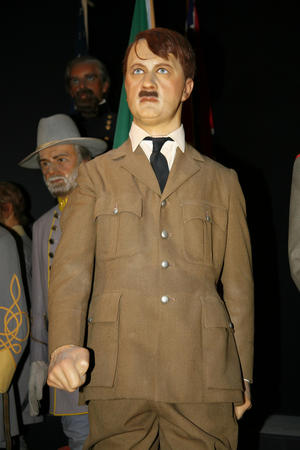Germany’s National Democratic Party in Turmoil
The NPD ended 2013 with a veritable Christmas Panto. On December 19, Holger Apfel, who had become party leader in 2011, stepped down from this and other party offices citing his ill health – a proposition that seemed implausible to your humble blogger (and many others). On December 22, the party’s highest decision making body appointed Udo Pastörs as interim leader. They also published a communique that urged Apfel to ‘disprove allegations directed against him’ and threatened to expel him from the party. Within hours, the nature of these allegations emerged, first in the blogosphere, then in the mainstream media: One (or two, according to other sources) ‘young comrades’ (male) claimed that the (drunken) leader had sexually harassed them during the electoral campaign. Shortly afterwards, Apfel left the party for good.
Homosexuality and Ultra-Nationalism
Sexual harassment is a crime. Homosexuality is not a crime. But it is the latter which ended Apfel’s long and distinguished career within the NPD. During thecurrent legal proceedings against the NPD, it emerged that a quarter of NPD functionaries has criminal convictions, mostly for hate crimes. Apfel’s predecessor (and potential successor) Udo Voigt as well as the interim leader Pastörs were convicted for inciting racial hatred. Voigt’s predecessor Günter Deckert, who was leader in the 1990s, served several years in prison.
Back in the 1990s, Herbert Kitschelt, in his seminal study on the ‘Radical Right in Western Europe’, traced the electoral weakness of the German Extreme (or Radical) Right to its obsession with the past. Part and parcel of this obsession are the style and culture of the interwar right. The Extreme Right of the 1920s and 1930s, with its images of hypermasculinity, became the spiritual home for scores of young men traumatised in the trenches. The NPD’s insistence on comradery echoes the spirit of these all-male paramilitary organisations.
The Nazis purged homosexuals from their own ranks and killed them on a large scale in the concentration camps while turning women into breeding machines for Reich and Führer. It does not take a great deal of psychoanalysis to make you wonder.
The latest NPD electoral manifesto is an arguably much tamer version of these homophobic (and possibly schizophrenic) tendencies within the right. The party wants to ban single homosexuals (let alone homosexual couples) from adopting children and opposes the notion of ‘homosexual families’ or marriages. According to the NPD, there is a biological struggle between (ethnic) Germans on the one hand and ‘foreigners’ on the other, and Germans must be encouraged by all means (including mini skirts) to breed faster, and more.
Apfel is married with three children, and that was part of his political persona. But while ‘respectability’ was at the core of his personal brand and his strategy for the party, ‘allegations’ of homosexual acts involving consenting adults would kill any political career in the party. And Apfel came to power by a narrow majority vote and was always controversial during his term as leader, making more than enough enemies within the party.
What’s Next?
The NPD is bankrupt, has very little electoral support and is embroiled in internal strife. The current leadership crisis will obviously not help the party. Apfel’s predecessor Voigt has already declared that he wants his old job back, while interim leader Pastörs will have his eyes on a more permanent arrangement. That is one lousy start of the European Parliamentary campaign.
I have often argued that trying to get the NPD banned by the Federal Constitutional Court is unnecessary and imprudent. Without the publicity brought about by the Court proceedings, it might simply have faded into virtual oblivion, just like the Republikaner party of 1990s fame. But even if the FCC refuses to ban the NPD (or, god forbid, if the ECHR overturns a ruling by the FCC), the NPD’s future does not look too rosy. While there is certainly a demand for eurosceptic and xenophobic policies, most voters find the NPD’s tarted-up version of grandpa’s fascism unpalatable. My medium-range prediction is therefore the emergence of a more modern anti-immigrant party in Germany.


RT @kai_arzheimer: #Pastörs is new leader of right-wing #NPD says @FAZ_Politik Was interim leader since Dec http://t.co/w7GgwZfybB , seen a…
The Great NPD Leadership Crisis (Christmas Edition) http://t.co/xfBi7RMG3d via @kai_arzheimer
RT @GoodwinMJ: “A tarted up version of grandpa’s fascism”. Must read from @kai_arzheimer on why Germany’s far right is falling apart http:/…
RT @GoodwinMJ: “A tarted up version of grandpa’s fascism”. Must read from @kai_arzheimer on why Germany’s far right is falling apart http:/…
RT @GoodwinMJ: “A tarted up version of grandpa’s fascism”. Must read from @kai_arzheimer on why Germany’s far right is falling apart http:/…
RT @GoodwinMJ: “A tarted up version of grandpa’s fascism”. Must read from @kai_arzheimer on why Germany’s far right is falling apart http:/…
RT @GoodwinMJ: “A tarted up version of grandpa’s fascism”. Must read from @kai_arzheimer on why Germany’s far right is falling apart http:/…
RT @GoodwinMJ: “A tarted up version of grandpa’s fascism”. Must read from @kai_arzheimer on why Germany’s far right is falling apart http:/…